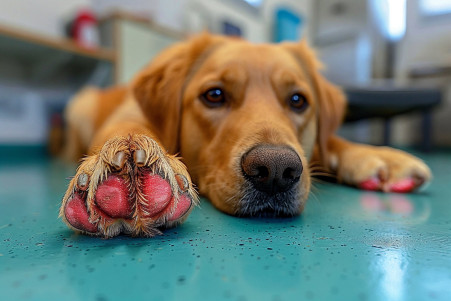Itchy Dog Paws: Causes, Treatments, and How to Help
6 February 2024 • Updated 6 February 2024

If your dog is constantly scratching, biting, licking, and chewing on their paws, they may be suffering from itchy paws. Itchy paws in dogs can be caused by a number of things, including allergies, infections, parasites, and dry skin.
Itchy paws treatments include regular maintenance, medicated shampoos, anti-inflammatory drugs, and allergy control. A vet can help you get to the bottom of the issue and find the best way to treat your dog’s itchy paws.
In this in-depth look at dog health, we’ve combed through a range of trusted sources and academic journals to better understand the many causes of itchy paws, including everything from dermatological issues to environmental causes, and the many treatments that are available.
We’ll also talk about the importance of prevention and the mental toll that itchy paws can take on our dogs, so you can find the best ways to help your furry friend feel happy and healthy.
What are the most common causes of itchy paws in dogs?
Solving the Mystery of Itchy Paws: What’s Causing Your Dog’s Itchy Paws?
There are a few common causes to consider when trying to solve the mystery of your dog’s itchy paws. Environmental and food allergies are the most likely suspects. Allergens, like pollen, can get stuck to your dog’s paws and cause an allergic reaction that results in itching, just like in humans, according to Heart + Paw. Food allergies can also cause itchy paws and lead to your dog chewing on them.
Whole Dog Journal explains that infections, like yeast overgrowth (Malassezia dermatitis), and parasites, like Demodex mites and hookworms, are also common causes of pruritic pododermatitis. In addition, behavioral issues, such as anxiety, can make the itching worse and lead to dogs biting or licking their paws more than usual as a response to stress or to deal with separation anxiety, according to Heart + Paw.
Seasonal environmental allergens can make itchy paws worse, and medical issues, like thyroid problems, can also contribute to the condition. That’s why it’s important to not only treat the symptoms but also to work with a vet to determine and address the cause of the problem to help your dog feel better and be happier.
Soothing Solutions: Natural Remedies for Dog Itchy Paws
When your dog is suffering from itchy paws, you want to help them find relief as quickly as possible. Luckily, there are several natural remedies that can help soothe their discomfort, and many of them are probably already in your kitchen.
One of the most well-known remedies is an oatmeal bath. Grind the oats into a fine powder and add them to your dog’s bath to help reduce inflammation, which can help soothe irritated paws, according to Holistapet.
Another option is to dilute apple cider vinegar with water and use it for paw soaks to help prevent yeast infections, thanks to its antibacterial properties, according to PetHelpful.
Coconut oil is another powerful weapon in the fight against irritation. The oil’s fatty acids help to moisturize the skin and create a protective barrier against irritants and parasites. Fish oils, which contain omega-3 fatty acids, are known for their anti-inflammatory properties, according to The Spruce Pets. They can help improve skin health, which may help reduce the need to scratch.
CBD oil is another remedy that is increasingly being used to help pets find comfort and balance, but it’s important to be careful since it’s still being researched and the FDA hasn’t approved it for medical use in pets, according to The Spruce Pets.
No matter which of these remedies you want to try, make sure you use them in moderation and that they are safe for your dog. For example, tea tree oil is toxic to dogs. Always check with your vet before using any natural remedy to make sure it’s safe for your dog.
Veterinary Treatments for Itchy Paws
If your dog’s itchy paws have become more than you can handle at home, there are a number of veterinary treatments that can help. The Whole Dog Journal lists medicated shampoos and topical treatments as a key part of managing infections and inflammation. These medicated cleansers are designed to target bacteria and yeast, which can cause and worsen itching.
The next step is often anti-inflammatory drugs, including corticosteroids. These powerful medications are prescribed by veterinarians and help reduce inflammation and itching. As Dr. Buzby points out, it is important to remember that these drugs should be used under the supervision of a veterinarian to avoid side effects.
Immunotherapy, which is covered by PetMD, is one treatment that is particularly exciting when it comes to long-term allergy management. This treatment involves exposing the immune system to allergens in an effort to reduce the immune response. Veterinarians may also consider advanced treatments like laser therapy because of its ability to target severe cases when other treatments have failed.
It’s important for pet parents to make sure they are following their veterinarian’s instructions when it comes to dosing and applying treatments. This is the only way to ensure a safe and effective recovery and make sure that each step taken is a step in the right direction for the dog’s health and comfort.
The Silent Sufferer: The Psychological Impact of Chronic Itch in Dogs
Far from just a skin-deep issue, chronic itch in dogs can often lead to a variety of other problems that go much further beneath the surface, including a significant impact on their mental health.
A study published in PMC even went so far as to say that canine atopic dermatitis (cAD) is linked to stress-indicative behaviors such as chewing, mounting, hyperactivity, and attention-seeking.
These behaviors can lead to a disruption in both the dog’s and the owner’s daily life, which can cause a cycle of stress and anxiety. It’s just as important to focus on the psychological well-being of dogs with chronic issues as it is to focus on their physical symptoms.
Michele Rosenbaum, VMD, DACVD, even suggests using Fear Free techniques to help dogs with stress during their veterinary visits, which can lead to a much more comfortable experience overall.
An article in ScienceDirect even went so far as to say that it’s important to focus on stress management in dogs with chronic conditions, and that veterinary care should take lifestyle factors into account.
The healing environment is a huge part of a dog’s recovery, and this shows how important it is to have a supportive, stress-free home for a dog to heal in. When this is achieved, it can lead to a dog’s physical and psychological recovery.
Leveling Up Paw Care: Prevention Is Key
The first step to keeping your dog’s paws in good shape is to make sure you’re checking in on them and cleaning them regularly. According to Preventive Vet, this means checking your dog’s paw pads for any signs of injury or infection on a regular basis.
It’s also important to make sure that the pads themselves aren’t too dry or cracked, and you can help keep them in good shape by using a veterinarian-approved moisturizer in moderation. You should also make sure to keep the hair between the pads trimmed to prevent matting and the build-up of dirt and other irritants, which can lead to itchiness and other issues, according to the American Kennel Club.
In addition to regular maintenance, it’s important to make sure your dog’s paws are protected during periods of extreme weather. For example, the American Kennel Club recommends using dog booties to protect your dog’s paws from hot pavement in the summer and icy terrain in the winter. If you can’t use booties, a high-quality paw wax can help protect your dog’s paws from the elements.
In addition to making sure you’re using the right products, it’s also important to make sure you’re using products that won’t irritate your dog’s skin.
This means looking for non-toxic, hypoallergenic products that are less likely to cause skin irritation.
Finally, make sure you’re keeping up with a regular paw care routine that includes regular washes and nail trims. Not only will this help keep your dog’s paws in good shape, but according to research published in PMC, it can also help improve their mobility, especially if they’re dealing with joint issues.
By making sure you’re taking care of your dog’s paws, you can help ensure that they’re able to enjoy a lifetime of fun and adventure.
Conclusion: A Paws-itive Outlook on Itchy Paws
From environmental allergies to infections and psychological factors, knowing the many causes of itchy paws is the first step in helping your dog find relief. From home remedies like oatmeal baths and omega fatty acid supplements to professional treatments like medicated shampoos and immunotherapy, the importance of finding the cause of the problem cannot be overstated—it will help you find a solution that works and provides long-term relief.
The importance of looking at the physical and psychological health of our dogs together has also been highlighted. Chronic itching can cause stress and changes in behavior, which means that the best treatments will address both the physical and psychological aspects of the problem. Preventative care, including regular grooming and paw care, is also important for avoiding potential problems.
In summary, regular care and check-ups are the best way to ensure your dog’s paws stay healthy. By being aware and taking a proactive approach, you can help your dog live a happy, healthy life without the discomfort of itchy paws.


